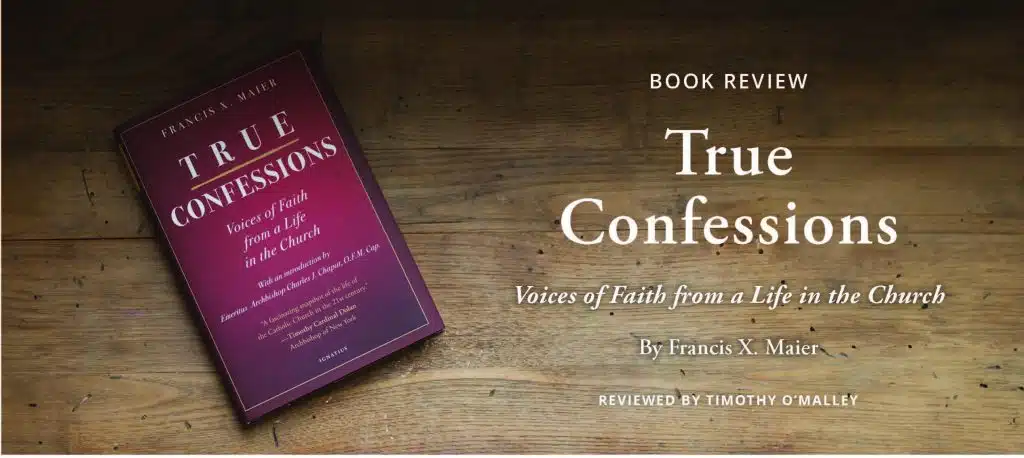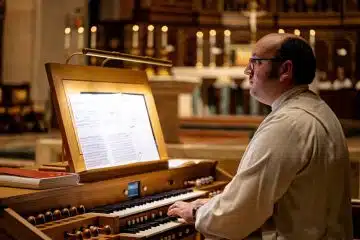Book Review: True Confessions

At the conclusion of a career serving the Church, Francis X. Maier could have written a memoir of his journey from script writer to editor of the National Catholic Register and then to serving Archbishop Charles Chaput in Denver and Philadelphia. Instead, he conducted detailed interviews with bishops, lay faithful, diocesan employees, educators, those raising children with intellectual disabilities, immigrants, non-Catholics and leaders of apostolates.
Maier’s choice is reflected in the title of the book, True Confessions: Voices of Faith from a Life in the Church. We tend to think of confession as merely a “tell-all,” but, as Maier notes in his concluding chapter, confession has a richer sense. Martyrs confess their faith through witness, and in praising God in the Augustinian sense, we acknowledge that God is God, and we are not (and that’s very good news).
This is the rich sense of confession operative in True Confessions. The reader discovers individual lay and ordained leaders in the Church striving to be faithful witnesses. While the polyphony of voices recorded is not exclusively in harmony, one common theme emerges: a love of the Church as mother and teacher.
The key to True Confessions appears at its conclusion. The author necessarily focused on decline, as the U.S. Church has seen a rise in disaffiliation and increase in the nones and experienced a loss of institutional credibility through the sexual abuse crisis and attenuation of Catholic identity at many of its educational institutions. All of this might lead the reader to dream of a golden age, whatever your preferred era might be, but Maier cautions, “…we have the Church of 2023, at least in part, because we once had the Church of 1947” (236).
As some interviewees highlighted, there is no golden age; the Church is called to be faithful in every age. Through Maier’s interviews, evidence appears of a fresh outpouring of the Spirit—a renaissance of Catholicism in the fidelity of bishops, priests and new lay apostolates.
If I have a single, minor critique of the book, it’s the focus on many new apostolates as the exclusive source of ecclesial renewal. For example, the University of Notre Dame currently has 750 theology majors and minors, and over 500 undergraduates signed up for a course on Augustine’s Confessions with Father Kevin Grove, C.S.C. Every spring, I have 265 students sign up (and over 100 more on a waitlist) for a course on marriage and family life.
The gift of Maier’s text is its invitation to look for those spaces of new life, of hope arising wherever one abides. In the last two years, I witnessed 15,000 people come to a Eucharistic Congress in the Diocese of Salt Lake City and 50,000 gather in Indianapolis for the National Eucharistic Congress. A renewal is happening; it’s afoot. And Maier gives us a lens to wonderfully behold the continuity of ecclesial fidelity, even in ages where it seems the forces of secularization, individualism and political violence seem impossible to overcome.
I’m grateful to Maier for giving me a way of reading the signs of the times such that I see the Church as a space of true confessors: faithful witnesses who seek to preach the Good News in our own age. Read this book and discover for yourself the manifold signs of hope in the Church.
Timothy O’Malley is the Director of Education at the McGrath Institute for Church Life, University of Notre Dame; author of Behold, Believe, Become: Meeting the Hidden Christ in Things We See, Say, and Do at Mass (Ave Maria Press, 2024).
Francis X. Maier, True Confessions: Voices of Faith from a Life in the Church. 284 pages. $24.95. Ignatius Press, 2024
This article appeared in the September 2024 edition of The Catholic Telegraph Magazine. For your complimentary subscription, click here.













